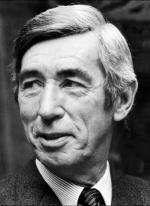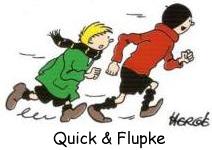Hergé ~ Georges Prosper Remi Creator of Tintin
Hergé ~ Georges Prosper Remi
|
 |
 Two pages of Tintin in the Land of the Soviets first appeared on January 10, 1929 in black and white on the pages of Le Petit Vingtièm e a weekly youth supplement to Le Vingtième Siècle, the renamed Le XXe Siècle.
The story, which ran until May 8, 1930, chronicled the adventures of a
young reporter named Tintin and his pet fox terrier Snowy (Milou) as
they journeyed through the Soviet Union.
Two pages of Tintin in the Land of the Soviets first appeared on January 10, 1929 in black and white on the pages of Le Petit Vingtièm e a weekly youth supplement to Le Vingtième Siècle, the renamed Le XXe Siècle.
The story, which ran until May 8, 1930, chronicled the adventures of a
young reporter named Tintin and his pet fox terrier Snowy (Milou) as
they journeyed through the Soviet Union. A year later in January 1930, Quick & Flupke, two street
urchins from Brussels, made their debut in what was to become a series
of 310 self-contained two-page comic strips (called "gags" in Europe).
The Quick & Flupke strips were especially clever because many of
them had both a visual gag and a verbal one. This makes them somewhat
difficult to translate into other languages when the verbal gag involves
a pun or rhyming words in French. (I should know, having translated 48
of these strips). Hergé says, "I had to abandon these rascals (in 1936)
because they were causing me a lot of worry as I became increasingly
occupied with Tintin." Two pages of Tintin continued to appear every
Thursday until May 1940, when the Germans
invaded Belgium.
A year later in January 1930, Quick & Flupke, two street
urchins from Brussels, made their debut in what was to become a series
of 310 self-contained two-page comic strips (called "gags" in Europe).
The Quick & Flupke strips were especially clever because many of
them had both a visual gag and a verbal one. This makes them somewhat
difficult to translate into other languages when the verbal gag involves
a pun or rhyming words in French. (I should know, having translated 48
of these strips). Hergé says, "I had to abandon these rascals (in 1936)
because they were causing me a lot of worry as I became increasingly
occupied with Tintin." Two pages of Tintin continued to appear every
Thursday until May 1940, when the Germans
invaded Belgium.As the war progressed, paper shortages forced Tintin to be published in a daily three- or four-frame strip, which meant that Hergé had to introduce more frequent gags and faster-paced action. Also, in order to avoid controversy, the focus of the adventures had to be moved away from current affairs.
Almost all of the Tintin adventures have a vivid humanism and a realistic feel produced by meticulous and wide ranging research, and, of course, Hergé's drawing style. Even adults enjoy Tintin for the many satirical references to the history and politics of the 20th century.
Hergé died on March 3, 1983 at age 75, having become a prominent national hero in his native Belgium. An Hergé Museum was opened in Louvain-La-Neuve in June 2009. And to this day his work remains a strong influence on comic artists, especially in Europe.
 There are many books and web sites devoted to Herge and Tintin,
some interesting and informative, others superficial and boring. So
rather than duplicating what has already been done, I've tried to look
at Herge's work from some different angles and focus on characters other
than Tintin. This is a work in progress and I expect to add new pages
periodically. For now, here are some pages to look at:
There are many books and web sites devoted to Herge and Tintin,
some interesting and informative, others superficial and boring. So
rather than duplicating what has already been done, I've tried to look
at Herge's work from some different angles and focus on characters other
than Tintin. This is a work in progress and I expect to add new pages
periodically. For now, here are some pages to look at:• The Philately of Herge and Tintin (Stamps, First Day Covers, postal cards)
• Quick & Flupke: Complete background, covers of all 45 books, and English translations
• Fred and Mile, Tim the Squirrel, Tom and Millie, with some English translations
• Cameos: appearances of Herge, Tintin, Quick & Flupke, and Mr. Mops in strips of other characters
• Quick & Flupke: products: toys, games, videos, stickers, jars, clothing, etc.
http://www.swapmeetdave.com/Herge/index.htm


0 Comments:
Post a Comment
<< Home